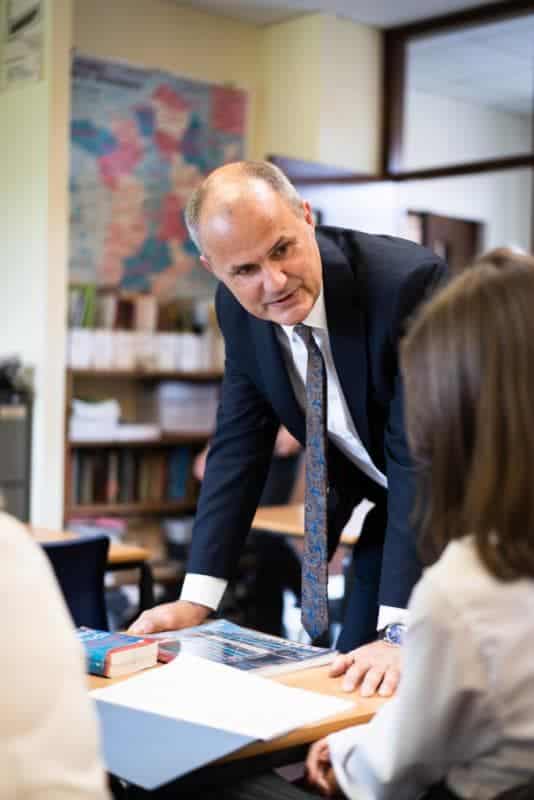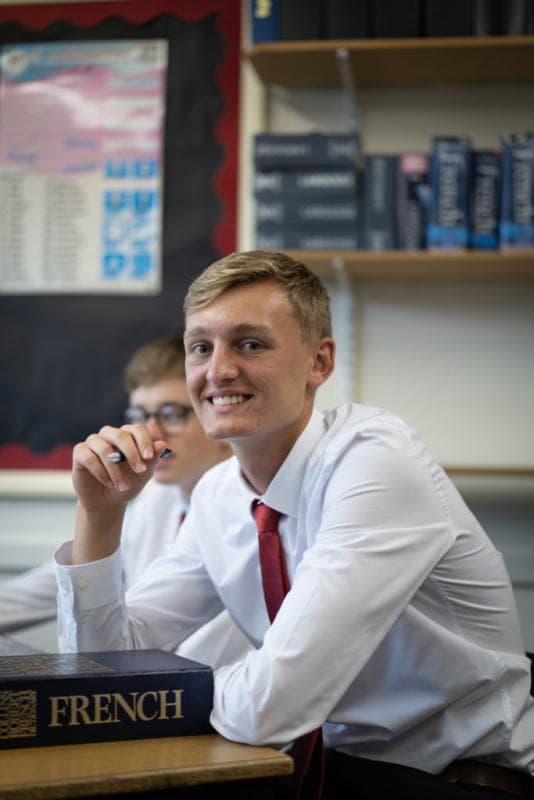Learning how to communicate in one of the most widely spoken and lyrical languages in the world.

Learning a modern foreign language is an essential skill in the 21st century. In the French department we find it an exciting and enjoyable challenge for all pupils. It stimulates their natural curiosity to know what everyday objects and actions are called in another language, it provides an intellectual challenge as they work on understanding grammatical structures and it helps to develop the social skill of being able to express themselves confidently. French remains the most widely used foreign language for UK residents because France is our closest continental neighbour, a major EU partner and our favourite holiday destination. Through studying French and visiting France pupils are able to compare aspects of French culture with our own and develop an appreciation of cultural difference and variety. They will gain direct access to the ‘jewels’ of French culture – vibrant cinema, 19th century fiction, the lyrics of Piaf and Brel. Ultimately they develop communicative and analytical skills that are highly desirable across a broad range of careers.
Examples of French class work
Mme Cliffe’s Year 9 French class have been writing calligrammes as part of their online lessons. These are poems in a shape which matches what they are about. You can read some examples here.
Lower School
In Years 7 and 8 pupils quickly learn the rules of pronunciation so that they can match sounds to letters and tackle new vocabulary effectively. Through the topics of Family, School, Free time, Home and Holidays they learn the concepts of gender, word order, using the present tense, expressing simple opinions and talking about the future. Year 7 ends with the popular and successful Taster Trip to the Opal Coast where all pupils order their meal in French. Year 8 continues with the introduction of the past tense and topics include Food, Health and Clothes. They make a conscious move towards increasing the complexity of their expression through greater use of connectives and new structures.
Middle School
In Year 9 pupils continue to build the foundations of core knowledge with the future tense, focusing on comparing towns and giving advice on healthy living. The GCSE specification is introduced in the middle of Year 9 and continues throughout the Middle School, with pupils learning to speak and write at length on topics already familiar from previous years as well as new subjects such as the Environment or New Technologies. They do extensive work to broaden their vocabulary, increase the complexity of their expression and boost oral confidence and fluency. At GCSE we follow the Edexcel exam specification.
Sixth Form

The A Level course covers a range of social issues and cultural topics which all relate to life in France and French-speaking countries. It builds on the topics of GCSE, but introduces new language so that you develop a thorough insight into aspects of French culture. You will study a French film in depth, and in the second year of the course a work of French literature. More contemporary issues such as modern French music, the changing nature of the family and the multicultural society, are also core elements of study.
Students develop their ability to express themselves fluently in the spoken language, carrying out an independent research project into an aspect of French culture or society that is of particular interest to them, and then discussing it in depth in the oral exam. Alongside the skill to translate accurately from and into French, students will extend their ability to write evidence-based, persuasive essays in the target language, essential preparation for university study.
In Year 12 the following topics are studied:
• The education system in France
• The world of work
• Changing family structures
• Music
• The Media
• Festivals and Traditions
• A French film
In Year 13 the following topics are studied:
• Multiculturalism and the rise of the far-right in France
• France under the Occupation and the Resistance
• A work of French Literature
• Independent Research topic
At the end of Year 13, French A Level has three exams: a Comprehension paper with Listening and Reading tasks; a Writing paper, comprising two essays and a translation; and an Oral exam.
We have a long record of success at French A Level, sending students on to study French at university every year, including Oxbridge, on a regular basis.
“It’s great to have had such good support and tuition during A Level French prior to starting all this new material” Sixth form student now at Birmingham University studying French
Exam results
The average of the results in French over the most recent three year period (2023, 2022, 2021) is:
| GCSE | |
| 9 | 21% |
| 9-8 | 43% |
| 9-7 | 56% |
| 9-4 | 97% |
| A Level | |
| A* | 34% |
| A* – A | 62% |
| A* – B | 78% |

